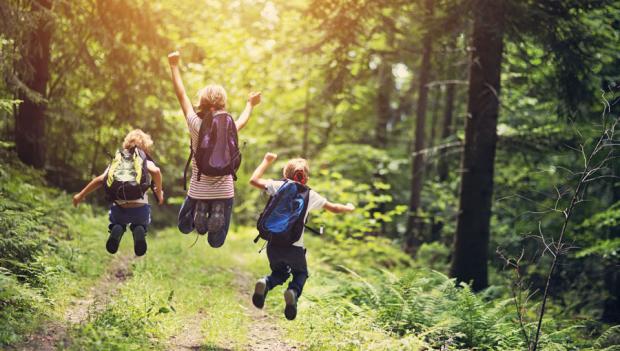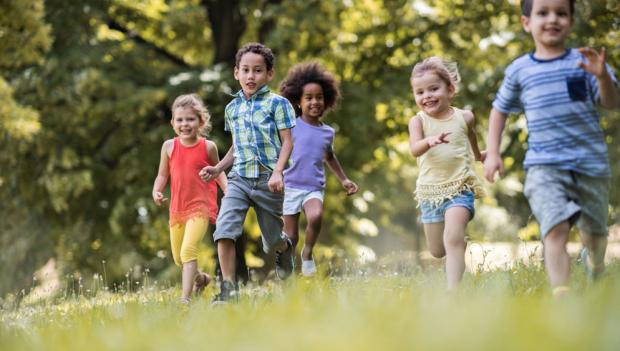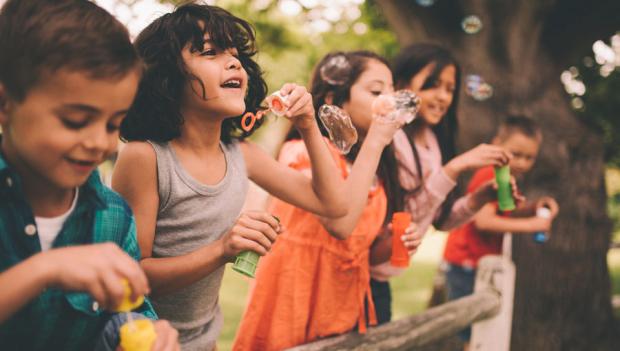In 2005 Richard Louv penned the term “Nature Deficit Disorder,” a phrase to describe the fact that children today are spending less and less time outside. Studies show that the average American child spends only four to seven minutes a day in unstructured play outdoors, and seven hours a day in front of a screen. All of that time indoors has serious implications, from obesity to increased risk of ADHD.
Here are 10 reasons why going outside is great for the health of your whole family.
1. Playing outside builds confidence
Whether your child is learning to navigate a trail by map, pitch a tent for the very first time or identify the type of salamander slithering in the creek behind her house, kids build confidence (and useful skills) by playing outdoors. As kids take risks outside (scrambling up a pile of rocks, swinging from a rope swing) their belief in their own physical abilities grows. That skill will serve them well for life.

2. Spending time outdoors teaches independence
Telling your child to go outside and play does more than get them away from their devices. As your child learns to explore the outdoors on his own or with a friend, he learns independence. Children often have little say in what happens in their lives, but when they play freely, they make their own choices. It’s the small, unstructured moments, like learning how to construct a fort out of sticks, that lead to independence and refine your child’s decision-making skills.
3. Playing outside gets kids active
Kids spend a tremendous amount of time inside every day. Though it’s not always easy to convince your child to play outside, especially in less than ideal weather, at least one expert has recently recommended kids have three hours of play outside each day. While that might seem daunting to parents, experts agree outdoor play allows children the freedom and space to run, jump, spin, crawl, build muscles and perfect their balance. With childhood obesity rates tripling since the 1970s, there’s no more imperative time to make sure your child gets and stays active.
Recommended: Top 10 Family-Friendly Hiking Trails in the East
4. Nature inspires the imagination
Cut your child loose in a park and watch as the world transforms into a magical playland. A tree branch morphs into a wand or cane; a bright red leaf is suddenly a secret scroll imprinted with a map to a hidden treasure. In nature, your child’s imagination blooms. Studies show that children who watch screens are only using two senses, which can seriously affect their perceptual abilities. When they play outside, guided by their imaginations, all of their senses are stimulated as they touch tree bark or grass, smell the plants and flowers, watch the clouds drift across the sky and taste the rain or snow.

5. Kids who play outdoors have better friendships and psychosocial health
A Canadian study recently found that kids who play outside have stronger friendships and better mental health based on scores such as functioning and aggression. Researchers say that some of those psychosocial benefits come from kids interacting with real people like neighbors, adults and children, and from learning their place in the community. Additionally, when kids play outside, inventing games or working with siblings and peers to build forts or catch bugs, they learn to collaborate—a skill that will serve them well throughout their lifetime.
6. Playing outside helps kids build resiliency
Most of our children’s days are spent indoors in a climate-controlled environment where their needs can be met in a few short steps to the bathroom or refrigerator. Bundling up for cold weather, feeling hunger without instant food access and even falling down and scraping a knee all help build resiliency in children. When kids experience minor pain or discomfort in the outdoors, they learn that they can overcome an uncomfortable situation and live without instant gratification.
Recommended: 11 Great Summer Camping Getaways in the West
7. Kids who play outside are stronger
There’s an alarming trend in physical health these days. Kids spend so much time sitting at their desks, hunched over their computers and school work, that there has been an increase in children referred to occupational therapy because of clumsiness, spinal health and overall lack of coordination. When kids are outdoors playing, whether that’s swinging from the monkey bars, riding bikes or wading through a stream, they’re building muscle, stamina and improving their motor skills. There’s no denying that outdoor play makes children physically stronger.

8. It’s good for their mental health
Over the past century, researchers have tracked a drastic increase of anxiety and depression among kids. Their hypothesis is that the decline in free play among children has caused a decline in their sense of feeling in control and their ability to set intrinsic goals (like the sense of accomplishment one feels when reaching the top of a mountain after a hard hike). Research has also shown that going on a hike in the woods can improve blood pressure, increase mental health and even decrease your risk of cancer. This is true of the young and old alike.
9. It’s good for their physical health
When you look outside and see your child shooting hoops, what you can’t see is their brain working furiously to fine-tune gross motor skills, learn depth perception and improve balance. Not only is playing outdoors great for a child’s motor skills and learning, research has shown that spending an extra hour outside each week can combat nearsightedness in children and enhance sleep.
10. Kids who play outdoors are more likely to protect nature
In the United States, we are extremely lucky to have so much public land to hike, climb, camp and bike on. But one major implication of our children spending so much time indoors, is that children who are disconnected from the outdoors may not feel the need to protect and defend our public lands as they age into adulthood. One recent study found that 87 percent of adults surveyed who played outside as kids maintained their love of the outdoors into adulthood. Furthermore, 84 percent of those adults said taking care of the natural world is a priority to them. If we want to protect the land for future generations, we need to get our current generations outside.
Are you ready for an outdoor adventure? Plan your camping trip!